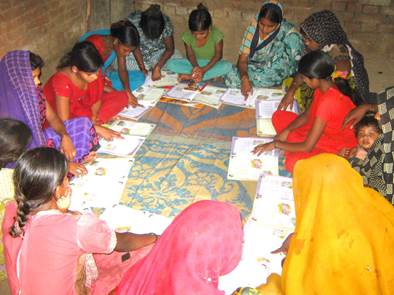|
TARA Akshar Reading Clubs "Education is one of the most important means of empowering women with knowledge, skills and self-confidence necessary to participate fully in the development process" Programme of Action of International Conference on Population and Development (ICPD). The government of
India and the civil society have initiated various creative and
innovative programmes to empower women. The aim of these programmes is
to educate women in the villag TARA Akshar Reading Clubs aim at strengthening and sustaining the literacy skills of the new learners after they have completed 49 days of the functional literacy programme, by providing them interesting information related to their day to day issues such as health, legal rights, livelihood matters etc. The concept of reading clubs envisages two variants: one which provides static service is called Apni Pathshala and the other, called Dag Dag Pathshala that gives mobile service. Apni Pathshala is for those women who can easily access the facility if it is available in their village. The mobile reading club, Dag Dag Pathshala, on the other hand, is for those women who suffer some social or other barriers to frequenting the static library. From the club library women can borrow books and other specially designed materials on health, legal rights, livelihood and other issues of their interest. The club is managed by TARA Akshar+ Sahelis selected from among TARA Akshar+ learners on rotational basis. Monitoring is one of the important conditions of the success of any development initiative. Therefore a few monitoring tools have been developed for this purpose, such as "Ek Saptah Ka Sawal" (a question of the week) where every week TARA Akshar+ Saheli will ask a question based on the available reading material and the members/ learners have to write their answers on postcards to be sent to a given address. "Hamari Saptahik Sikh" (Our Weekly Learning) is another monitoring tool designed as a poster. Every week TARA Akshar+ Saheli has to paste Hamari Sikh poster on the wall of the reading club and the club members write on the same poster what they have learnt that week and also mention the source of their information together with their name and date of writing. The posters are monitored by controllers and their assessments are consolidated by the partner organisations. Such tools help in assessing the learnerís ability and, if required, a necessary corrective action is taken to maintain the quality of learning. 175 static TARA Akshar reading clubs have already been launched and positive responses were received from the learners. A genuine involvement of the concerned staff is required to make this model of sustaining literacy a suitable one from the rural womenís perspective. q Sutul Srivastava
|
 es so that they can contribute to the
development of the society on an equal footing. The literacy programs
are very successful in imparting functional literacy to illiterate women
but the rural social structure does not support them in sustaining their
newly developed skills. According to Lisa Krolak of UNESCO Institute for
Education, "If literacy is not placed within a functional framework of
relevance and if newly acquired literacy skills are not constantly used
and improved, there is a real danger that those who have acquired
literacy skills will relapse into illiteracy and the huge investment in
school education and adult literacy classes will be wasted." In India
"most of the ongoing literacy programmes do not provide long-term
support to neo-literates. Unless they are provided effective support
through reading and learning materials, the may again fall into the
category of illiterates".
es so that they can contribute to the
development of the society on an equal footing. The literacy programs
are very successful in imparting functional literacy to illiterate women
but the rural social structure does not support them in sustaining their
newly developed skills. According to Lisa Krolak of UNESCO Institute for
Education, "If literacy is not placed within a functional framework of
relevance and if newly acquired literacy skills are not constantly used
and improved, there is a real danger that those who have acquired
literacy skills will relapse into illiteracy and the huge investment in
school education and adult literacy classes will be wasted." In India
"most of the ongoing literacy programmes do not provide long-term
support to neo-literates. Unless they are provided effective support
through reading and learning materials, the may again fall into the
category of illiterates".